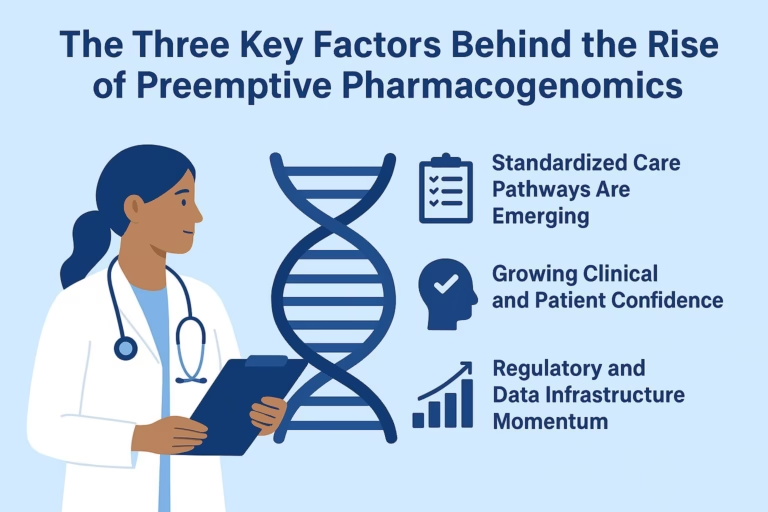Pharmacogenomics (PGx) continues to redefine how we approach prescribing medications, making therapy more precise, safer, and in many cases, more effective. Yet, despite the science having come a long way, real-world implementation still faces hurdles. Few understand this better than Dr. Patricia Camazzola, a seasoned pharmacist and founder of RxOptimization.
With decades of clinical experience under her belt, Dr. Camazzola has emerged as a key voice in helping health systems, physicians, and patients integrate pharmacogenomics into routine care. Her mission is clear: to close the gap between evidence-based PGx guidelines and how medicine is practiced daily.
In this interview, she shares her personal journey, common misconceptions that hold PGx back, and the one change she believes will accelerate adoption across healthcare systems.
APGxA: Dr. Camazzola, your work bridges clinical pharmacy and precision medicine. What drew you to pharmacogenomics?
Dr. Camazzola: As a pharmacist, I often found myself fielding questions from patients like, “Why did this medication work for my friend but not for me?” That curiosity pushed me to dig deeper into the science of drug response. I started looking beyond factors like age, weight, or kidney and liver function, and discovered pharmacogenomics as a powerful tool to explain variability in treatment outcomes.
Eventually, I began offering PGx services as part of comprehensive medication consultations. Through RxOptimization, I now provide direct-to-patient support, including PGx testing, result interpretation, and risk assessments such as anticholinergic burden. I also consult with providers to help them incorporate PGx into their practice—offering education, implementation tools, and decision-making support.
APGxA: You’ve worked closely with providers and health systems to implement PGx. What’s worked best, and what’s been hardest?
Dr. Camazzola: Implementation is a journey. The most effective strategies have focused on patient education, provider training, and making the data actionable. One of the biggest challenges is cost, many patients still face financial barriers because PGx testing and result interpretation aren’t always covered by insurance.
Another hurdle is helping providers interpret test results in a way that fits within their clinical workflow. That’s where pharmacists come in. We’re trained to evaluate medication risks in context, combining PGx insights with drug interactions, comorbidities, and therapeutic goals.
Understanding the Impact of Patricia Camazzola on Pharmacogenomics
Also, it’s not enough to just test once. You need systems in place to make PGx results available whenever a medication is prescribed, now and in the future. That means integrating flags, alerts, or embedded notes within the EHR to ensure the information gets used and not forgotten.
APGxA: What are some common misconceptions prescribers have about PGx, and how do you address them?
Dr. Camazzola: One of the most common misconceptions is that pharmacogenomics is only useful for rare or specialized cases. In reality, the FDA has published PGx labeling recommendations for over 400 drugs, and CPIC has issued peer-reviewed guidelines for dozens of commonly prescribed medications.
Many physicians were never taught about PGx in medical school. And those with years of experience often rely on clinical intuition rather than genomics data. But here’s the issue, many are unaware that ignoring FDA PGx labeling or CPIC guidelines could actually be a liability.
Prescribers need to understand that there is legal risk in overlooking pharmacogenomic red flags. If a patient experiences a serious adverse reaction from a drug with known PGx guidelines, and the provider didn’t consider genetic testing, it could be viewed as negligence.
As I’ve said before: Physicians/prescribers are often not aware of the liability associated with not considering PGx FDA recommendations and CPIC guidelines for commonly used medications.
Another misconception is that if insurance doesn’t cover PGx testing, then it must not be important. But this reflects a deeper issue, payors are often the ones determining how medicine is practiced, not science.
APGxA: What role do pharmacists play in driving successful PGx adoption?
Dr. Camazzola: Pharmacists are central to the process. We’re uniquely positioned to:
- Translate complex genetic results into actionable treatment decisions
- Educate prescribers and patients
- Advocate for better insurance coverage
- Support health systems with software tools and policies to integrate PGx into clinical practice
We’re also contributing to research and even developing AI tools to improve the usability of PGx results. Most lab reports aren’t user-friendly, and pharmacists help distill that information into something providers can act on.
Ultimately, PGx isn’t a standalone service, it should be embedded in how we think about every prescription, every patient, every time.
APGxA: Looking ahead, what do you think will define the next five years of pharmacogenomics?
Dr. Camazzola: Two things: recognition of pharmacists as providers, and insurance coverage of both PGx testing and result interpretation. Pharmacists are the most accessible healthcare professionals and should be recognized as essential providers across all 50 states.
We also need to see more IT innovation—tools that make PGx data available wherever medications are prescribed, from hospitals to community pharmacies. We can’t afford to silo genetic data anymore. It must follow the patient across the continuum of care.
Dr. Camazzola’s insights are a timely reminder that pharmacogenomics isn’t just about science, it’s about changing systems, perceptions, and workflows. And until reimbursement, education, and liability awareness catch up with the data, the burden of driving PGx forward will continue to fall on a handful of passionate clinicians like her.
As she points out, “If a service is not covered by insurance, it is not viewed as a priority or necessity by prescribers or patients.” In a healthcare system where economics often dictates practice, pharmacogenomics will need strong advocates, bold policy shifts, and a wider embrace of innovation to reach its full potential.
For more articles on PGx go here.
Dr. Patricia Camazzola, a leading Pharmacogenomics Consultant and the Founder of RxOptimization, emphasizes the crucial need to integrate genetic data throughout the patient care journey. Her expert perspective highlights the transformative impact of pharmacogenomics on healthcare systems, perceptions, and operational practices. As she underscores, the alignment of reimbursement policies, educational initiatives, and liability considerations is paramount for advancing the field and ensuring equitable access to these vital services.





